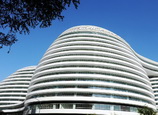
"China will import more and more agricultural products, and exports of agricultural goods will become less and less," said Ning, adding he expects more Chinese companies to look overseas for agricultural resources.
While China has achieved solid summer grain harvest s for nine consecutive years, the country's imports of grains have also hit a historic high.
During the first half of this year, its grain imports surged by 41.2 percent from a year earlier to 40.85 million metric tons, driven by imports of corn and wheat. From January to July, China's corn imports alone jumped by more than 15 times year-on-year , official figures show.
In his annual government work report in March, Premier Wen Jiabao encouraged Chinese companies to expand abroad through mergers and acquisitions, and since the 2008 global financial crisis, there has been a steady flow of overseas investments by companies within the food sector.
One of the largest was completed by Shanghai 's Bright Food (Group) Co, which last year bought a 75 percent stake in the Australian food business Manassen Foods in a deal valued at A$530 million ($556 million), including debt.
However, not all deals have been completed so smoothly.
Earlier this year, despite the New Zealand government's approval, a $210 million planned purchase of the 8,000 hectare Crafar farm estate on the country's North Island by Shanghai Pengxin Group Co Ltd was put on hold after the country's High Court ordered the government to re-evaluate the decision, questioning the economic benefits of the deal to New Zealand.
















 'Gangnam style' life of young rich in Chongqing
'Gangnam style' life of young rich in Chongqing


![]()
